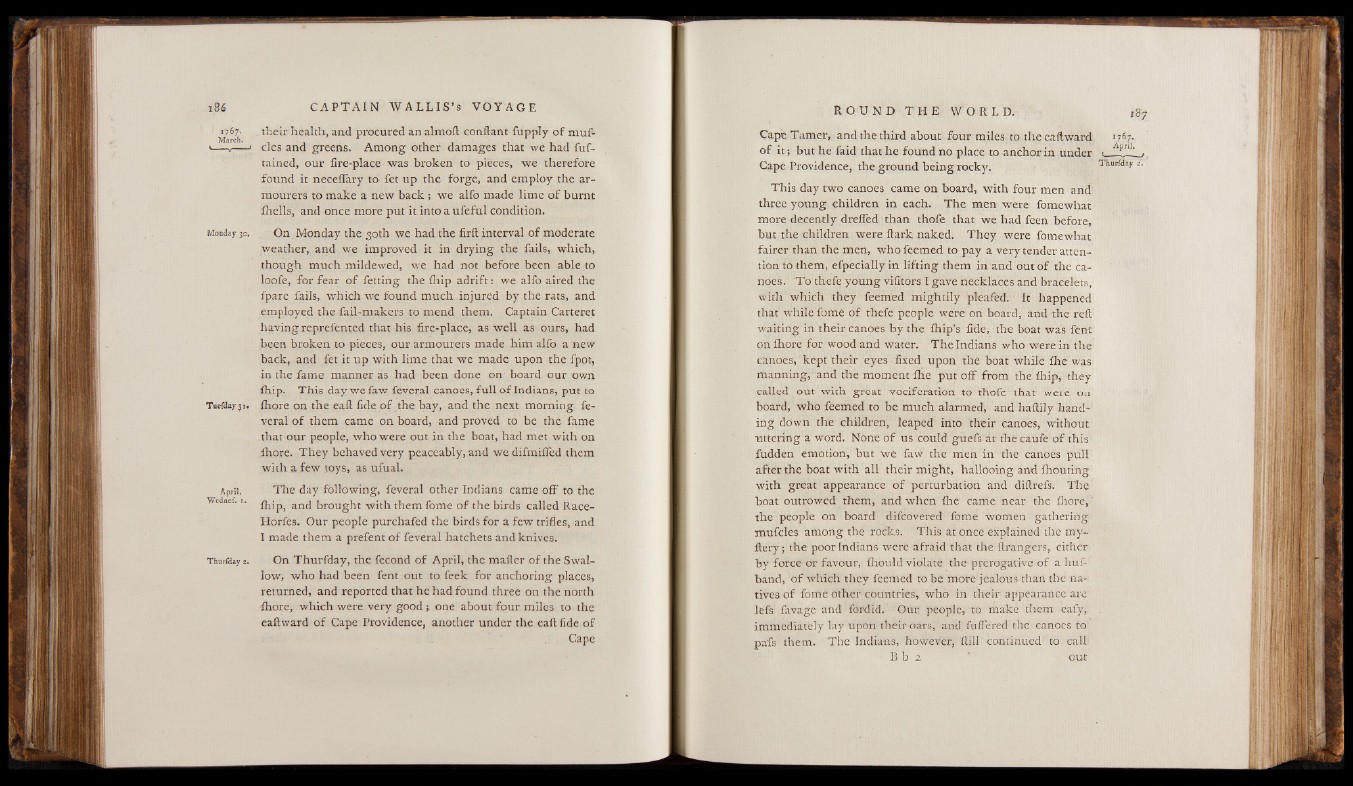
i8<5
1767. their health, and procured an almoft conftant fupply of mu ft
>--- .—'—j cles and greens. Among other damages that we had fuftained,
our fire-place was broken to pieces, we therefore
found it neceflary to fet up the forge, and employ the armourers
to make a new back ; we alfo made lime o f burnt
Ihells, and once more put it into a ufeful condition.
Monday 30. . On Monday the 30th we had the firft interval o f moderate
weather, and we improved it in drying the fails, which,
though much mildewed, we had not before been able to
loofe, for fear o f fetting the Ihip adrift: we alfo aired the
fpare fails, which we found much injured by the rats, and
employed the fail-makers to mend them. Captain Carteret
having reprefented that his fire-place, as well as ours, had
been broken to pieces, our armourers made him alfo a new
back, and fet it up with lime that we made upon the fpot,
in the fame manner as had been done on board our own
Ihip. This day we faw feveral canoes, fu ll of Indians, put to
T u e fla y ji. Ihore on the eaft fide of the bay, and the next morning feveral
of them came on board, and proved to be the fame
that our people, who were out in the boat, had met with on
Ihore. They behaved very peaceably, and we difmiifed them
with a few toys, as ufual.
April. The day following, feveral other Indians came off to the
Wednef. i. antj brought with them fome of the birds called Race-
Horfes. Our people purchafed the birds for a few trifles, and
I made them a prefent of feveral hatchets and knives.
Thurfday 2. On Thurfday, the fécond of April, the mailer of the Swallow,
who had been fent out to feek for anchoring places,
returned, and reported that he had found three on the north
•Ihore, which were very good ; one about four miles to the
eaftward of Cape Providence, another under the eaft fide of
Cape
Cape Tamer, and the third about four miles to the eaftward 1767.
of i t ; but he faid that he found no place to anchor in under ■ pnl' _.
Cape Providence, the ground being rocky. Thurfday 2.
This day two canoes came on board, with four men and
three young children in each. The men were fomewhat
more decently drelfed than thofe that we had feen before,
but the children were ftark naked. They were fomewhat
fairer than the men, who feemed to pay a very tender attention
to them, efpecially in lifting them in and out of the canoes.
To thefe young vifitors I gave necklaces and bracelets,
with which they feemed mightily pleafed. It happened
that while fome of thefe people were on board, and the reft
waiting in their canoes by the Ihip’s fide, the boat was fent
on Ihore for wood and water. The Indians who were in the
canoes, kept their eyes fixed upon the boat while Ihe was
manning, and the moment Ihe put off from the Ihip, they
called out with great vociferation to thofe that were on
board, who feemed to be much alarmed, and haftily handing
down the children, leaped into their canoes, without
uttering a word. None of us could guefs at the caufe o f this1
fudden emotion, but we faw the men in the canoes pull
after the boat with all their might, hallooing and Ihouting
with great appearance of perturbation and diftrefs. The
boat outrowed them, and when Ihe came near the Ihore,
the people on board difcovered fome women gathering
mufcles among the rocks. This at once explained the my-
ftery; the poor Indians were afraid that the Itrangers, either
by force or favour, Ihould violate the prerogative of a huft’
band, o f which they feemed to be more jealous than the natives
of fome other countries, who in their appearance are
lefs favage and fordid. Our people, to make them eafy, .
immediately lay upon their oars, and fuffered the canoes to
pafs them. The Indians, however, ftill continued to call
B b 2 ' out